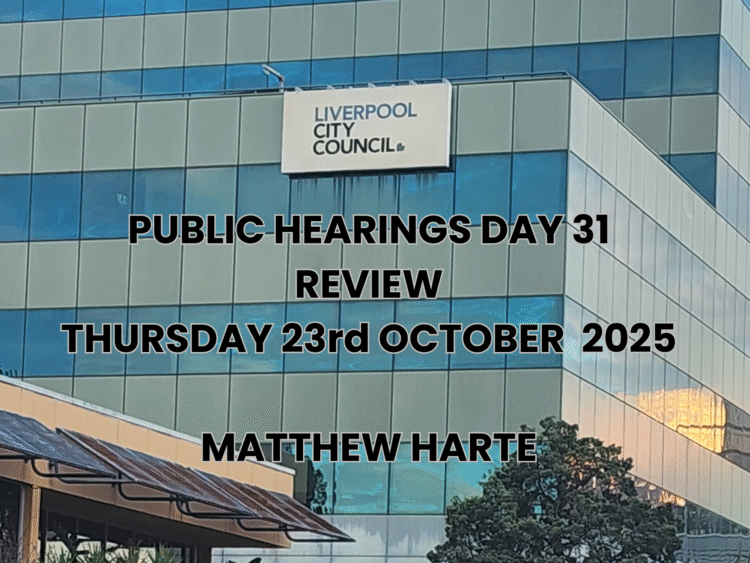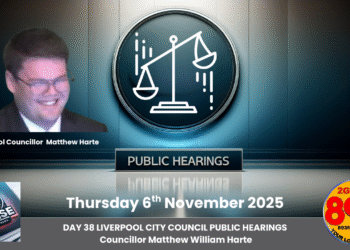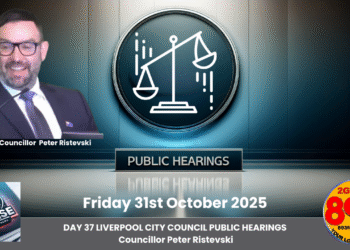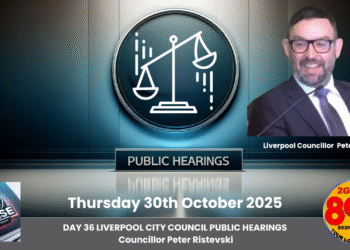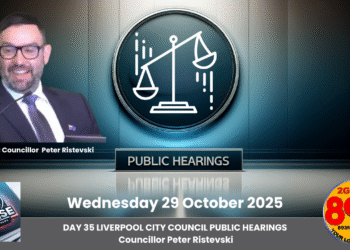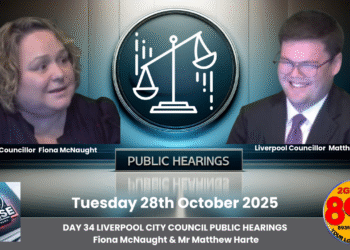Councillor Matthew Harte’s Testimony
- Election Dynamics and Political Strategy: Councillor Harte, under oath from the previous day, discussed the voting patterns in Liverpool City Council’s North and South Wards during the 2021 and 2024 elections. He noted a consistent trend where each ward typically elects two Liberal and two Labor councillors, plus one independent or minor party candidate, with the mayor’s position influencing the balance (Liberal in 2021 and 2024, Labor in 2016).
- Assistance to Independent Candidate: Harte detailed his assistance to Jason Breton, an independent candidate in the 2021 election, strategically targeting the South Ward for a better chance of election against less entrenched independents like Councillor Harle in the North Ward. He admitted that a key motivation was the expectation that Breton, if elected, would be “friendly” or sympathetic to Liberal Party policies and councillors, providing an advantage through aligned voting and a good working relationship.
- Definition of “Friendly”: Significant discussion focused on clarifying “friendly,” with Harte eventually agreeing it meant a likelihood of supporting the Liberal platform, though he initially framed it as based on personal character and pragmatism rather than strict policy alignment. He confirmed he would be more inclined to assist candidates sympathetic to Liberal goals rather than those with opposing views.
- Campaign Support and Donations: Harte testified about assisting Breton with campaign logistics, including potentially providing or facilitating envelopes as an in-kind contribution (though he couldn’t recall specifics) and helping with a cash receipt book for donations. He acknowledged filling out receipts for donations, such as a $5,000 contribution from Sam Sofi, though he wasn’t physically present for the electronic transfer, relying on notifications from Breton.
- Post-Election Disclosure Assistance: Harte described assisting Breton with post-election disclosure obligations after receiving a request via phone, likely in late 2021 or early 2022. He helped identify and fill out forms (assuming a half-yearly disclosure), finding the process straightforward for a small campaign like Breton’s. He received transaction summaries via email and possibly maintained the cash receipt book, ensuring all monetary and non-monetary contributions were documented.
- Knowledge of Prohibited Donors: Harte confirmed awareness of Electoral Commission rules against accepting donations from property developers, noting it as a “pertinent consideration” with potential legal repercussions. He couldn’t recall if he specifically warned Breton about this during campaign discussions.
Matters Arising of Interest to Ratepayers: Are Ratepayers Getting Good Value for Money?
Ratepayers of Liverpool City Council are concerned about whether their contributions result in effective, transparent governance. The following matters from Day 31 of the inquiry highlight areas where value for money is in question:
- Political Influence and Representation:
- Strategic Candidate Support: Councillor Harte’s admission of assisting Jason Breton with the expectation of creating a “friendly” independent councillor aligned with Liberal interests raises concerns about the integrity of representation. If councillors or candidates are supported based on party advantage rather than community merit, ratepayers may question whether their elected officials truly prioritise local needs over political agendas, potentially diminishing the value of their rates.
- Non-Residential Candidacy: Harte’s own election via the non-residential roll (as discussed in prior days) combined with his role in facilitating similar arrangements for others suggests a potential loophole that may allow candidates with limited local ties to influence council decisions. Ratepayers may wonder if their money funds a council that reflects Liverpool’s community or external political strategies.
- Transparency in Campaign Financing:
- Campaign Contributions and Disclosures: Harte’s involvement in handling Breton’s campaign logistics, including filling out disclosure forms and possibly maintaining receipt books, blurs the lines between independent and party-affiliated campaigns. His uncertainty about specifics (e.g., envelopes, non-monetary contributions) and lack of clear recollection about advising on prohibited donors like property developers raises concerns about transparency. Ratepayers may question if undisclosed or improperly managed donations influence council decisions, affecting the accountability they expect for their contributions.
- Potential Conflicts of Interest: The close relationship between Harte, Mayor Mannoun, and associated campaigns (including family ties like Samer Mannoun’s potential involvement) suggests a network of influence that could prioritise party loyalty over public interest. If ratepayer-funded council operations are swayed by such networks, the value of their money in ensuring fair governance is undermined.
- Governance Preparedness and Compliance:
- Councillor Knowledge and Training: Harte’s limited recall of specific Electoral Commission forms and processes, despite assisting others, indicates potential gaps in understanding critical compliance obligations. If councillors or their associates mishandle disclosures or campaign rules, ratepayers bear the risk of legal or financial repercussions, questioning whether their rates support a well-prepared governing body.
- Efficiency of Council Dynamics: The consistent election pattern of split party representation with an independent “swing” vote, as described by Harte, suggests potential for ongoing division or strategic alliances rather than cohesive decision-making. Ratepayers may not receive optimal value if council time and resources are spent on political maneuvering rather than addressing community priorities.
Conclusion
The Day 31 proceedings of the Public Inquiry into Liverpool City Council reveal significant concerns about political influence, transparency in campaign financing, and governance preparedness that impact whether ratepayers are receiving good value for their money. Strategic support for candidates based on party alignment, unclear handling of campaign contributions, and potential compliance gaps suggest that council operations may not always prioritise community interests. Ratepayers deserve assurance that their contributions fund transparent, accountable, and locally focused governance, yet evidence from this hearing indicates areas where value for money remains uncertain. As the inquiry continues, these issues require close attention to ensure improvements at Liverpool City Council.









